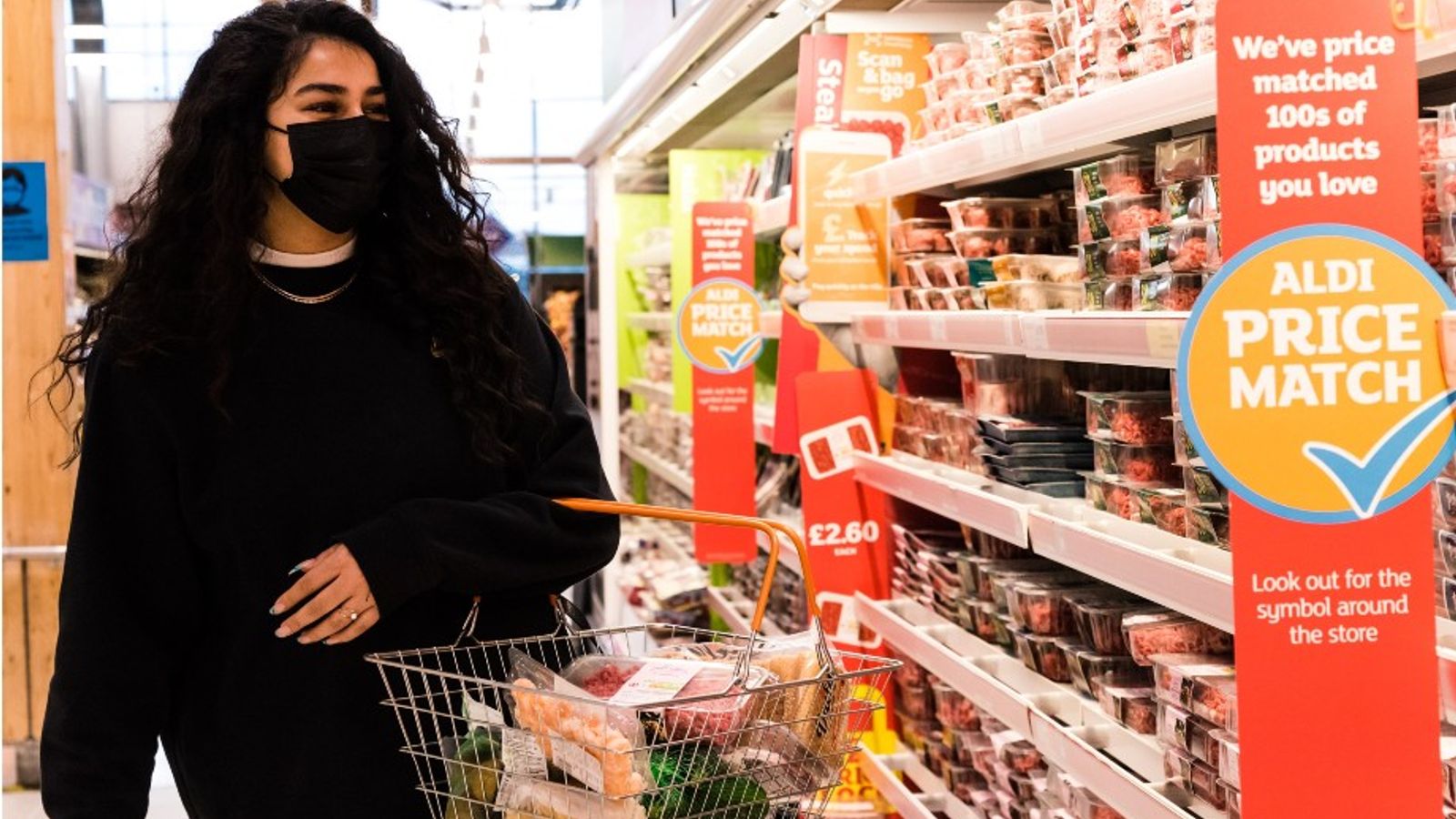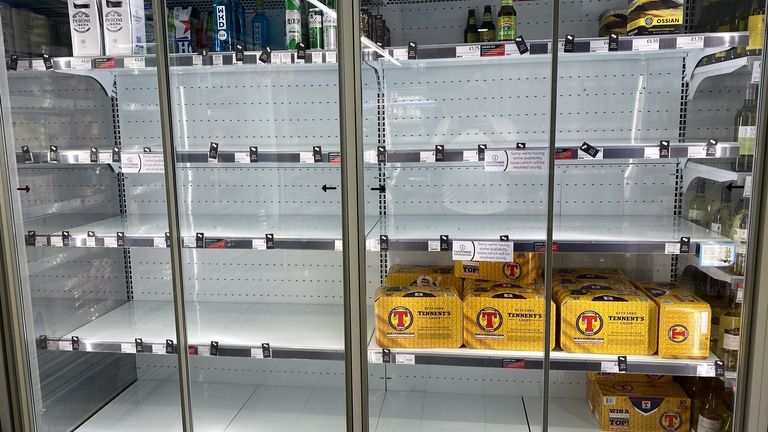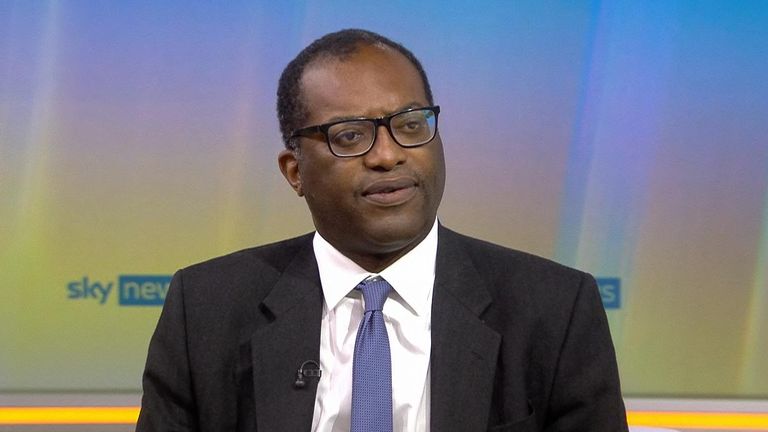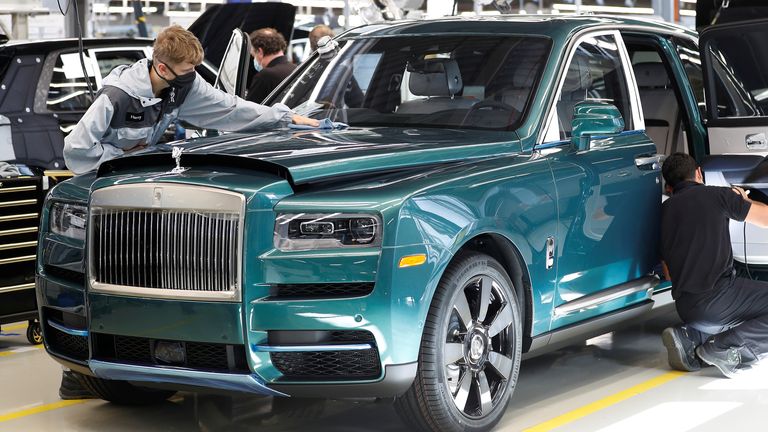Supermarkets Sainsbury’s, Iceland and Co-op have revealed they are suffering stock shortages as concerns grow about the impact of the so-called “pingdemic”.
Sainsbury’s, Britain’s second biggest supermarket, said it “might not always have” products customers want while Iceland revealed it was also being hit and urged customers not to stockpile.
Co-op said it was “running low on some products” while Lidl said the situation was becoming “increasingly difficult” and starting to have an impact on operations.
Empty shelves were seen at a number of supermarket chains.
It came as business secretary Kwasi Kwarteng said the government was “very concerned” about the disruption to businesses being caused as COVID-19 alerts result in workers having to isolate.
The pingdemic – in some cases combined with problems caused by lorry driver shortages – has been causing growing problems across UK businesses over the past week:
• The British Retail Consortium said it was “increasing pressure on retailers’ ability to maintain opening hours and keep shelves stocked”.
• BP said it had experienced fuel supply issues at some of its UK petrol stations and closed “a handful of sites” temporarily due to lack of diesel and unleaded fuels.
• Sky News revealed a shortage of patio gas cylinders – used for barbecues – caused by high demand combined with supply issues and worsened by the pingdemic.
• Trade body UK Hospitality said about a fifth of workers in the pubs, hotels and restaurants sector were self-isolating.
• Greene King said it had to close 33 pubs while Wetherspoons said in a few cases some had to open a couple of hours later than normal and another pub chain, Young’s, said hundreds of its workers were off.
• AA chief executive Jakob Pfaudler emailed customers to apologise to those who “may have had a longer wait than usual” because call centres had been “impacted by the recent surge in the Delta variant”.
• Manufacturing body Make UK said about a fifth of factory workers were off.
• Car maker Vauxhall reduced the number of shifts at its Luton plant from three to two.
• Hundreds of workers were off self-isolating at Britain’s biggest car plant in Sunderland.
• Rolls-Royce Motor Cars said the situation had pushed it to a “critical point” which might mean it having to halve production.
• Marks & Spencer chief executive Steve Rowe said the number of staff isolating meant the chain might have to reduce opening hours.
• Tim Morris, the chief executive of UK Major Ports Group, said a number of big port operators had reported 10% of their staff being work.
• The British Meat Processors’ Association has said it was also facing shortages and that if the situation deteriorated further some production lines might have to be shut down altogether
• Long queues were seen at Heathrow last week after security staff were told to self-isolate
Sky News contacted a number of major retailers to ask how they were being affected.
Sainsbury’s said in a statement: “We are working hard to ensure customers can find what they need.
“While we might not always have the exact product a customer is looking for in every store, large quantities of products are being delivered to stores daily and our colleagues are focused on getting them onto the shelves as quickly as they can.”
Iceland managing director Richard Walker said: “We are seeing some stock shortages across stores, as a result of both staff absences caused by the pingdemic and the ongoing HGV driver shortage.
“We need absolute clarity from the government as soon as possible, including a Test and Trace self isolation exemption list, to include all retail workers and HGV drivers.”
Mr Walker said in response the chain was recruiting 2,000 new workers. It said earlier this week that it had to close a number of stores, with 1,000 staff off due to COVID.
He added: “We are urging people to avoid stockpiling and to shop responsibly – the industry is working hard to resolve the issue and panic buying will only increase pressure on retail workers who have worked tirelessly to feed the nation throughout the pandemic.”
A Co-op spokesperson said: “We are sorry that we are running low on some products.
“Like many retailers, we are impacted by some patchy disruption to our deliveries and store operations but we are working closely with our suppliers to get re-stocked quickly.”
The Co-op is recruiting up to 3,000 temporary colleagues to keep depots working and stores re-stocked.
A Lidl spokesperson said: “Like all other retailers, the situation is becoming increasingly difficult as we have more and more colleagues having to self-isolate after being notified by the Track and Trace system.
“Whilst this is starting to have an impact on our operations, our teams are working hard to minimise any disruption to customers.”
Business leaders have been calling for the government to bring forward the date for when fully-vaccinated people who receive an alert about close contact with a confirmed COVID case no longer have to isolate.
Currently the rule change is scheduled for 16 August and ministers have said that will not change.



